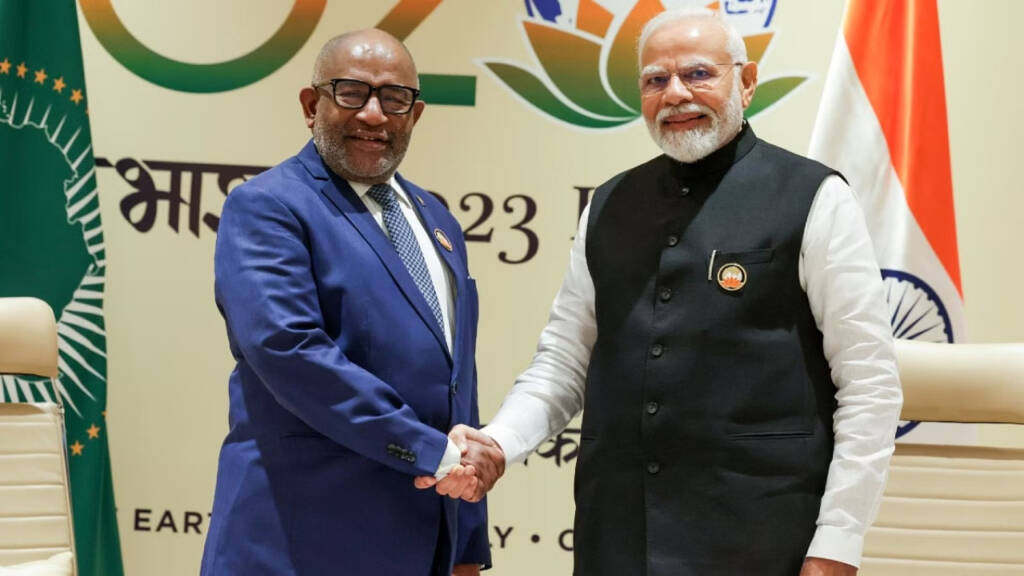India, under the leadership of PM Modi, is making significant strides in reshaping the global order. Following its active role in BRICS, India’s recent move to include the African Union in the G20 has garnered attention and acclaim. This strategic decision not only resonates positively in the Global South but also sends ripples across the Western world.
With Africa securing a seat at the G20 table, the dynamics of international diplomacy are poised for transformation.
The West and Africa: A Complicated History
Until the G20 Bali summit in 2022, the African Union held the status of a guest invitee within the influential G20, a position it had held for the past seven years. This limited participation was primarily due to the reluctance of Western powers, who historically maintained a contentious relationship with the African continent. Western nations have a complex history in Africa, marked by resource exploitation, colonialism, and instances of derogatory language directed towards the African Union.
The West’s historical actions in Africa have included the ruthless exploitation of its abundant resources and the imposition of colonial rule marked by oppression and racism. Even in more recent times, figures like Donald Trump infamously referred to African countries in derogatory terms. Furthermore, when Western institutions like the IMF and World Bank extended financial assistance to African nations, it often came with burdensome conditions and interference.
However, India’s recent move to advocate for and secure a seat for the African Union within the G20 has changed the dynamics. This action represents a significant shift, offering hope for a more inclusive global order that respects the interests of African nations, potentially moving away from the historical patterns of Western exploitation and disregard for African aspirations.
Africa’s Seat at the G20 Table
Relevant topics concerning Africa, encompassing food security, infrastructure, health, and migration, have found their place on the G20 agenda. This inclusion, though partial, reflects an attempt to represent African interests within the forum.
In 2010, the G20 took a notable step by establishing a permanent Development Working Group and endorsing the Seoul Development Consensus for Shared Growth. This framework emphasized the importance of private-sector development and fostering equitable partnerships between low-income countries and donors. Africa’s presence on the G20 stage was thus solidified.
The year 2014 marked a turning point when the G20 exhibited heightened interest in Africa during the Ebola epidemic in West Africa. Commitments were made to bolster capacities for disease prevention and response, indicating an evolving engagement with African issues.
However, despite these strides, systematic involvement of African perspectives within the G20 has remained limited. African voices have been conspicuously absent from the forum’s deliberations. Presently, South Africa stands as the sole African nation with a permanent seat at the G20 table, a situation that restrains its ability to authentically represent the entire continent.
Yet, recent developments seem to change the course.
Read More: EU attempted to ‘Avoid Trade’ with Russia, failed miserably!
India: Paving Africa’s Path to G20 Prominency
During India’s G20 Presidency this year, Prime Minister Narendra Modi took significant steps to advocate for the integration of African priorities into the G20 agenda. The G20, comprising 19 countries and the European Union, serves as an intergovernmental forum. PM Modi proactively reached out to the leaders of member countries, urging them to consider granting the 55-nation AU a permanent membership in the Group.
India’s commitment to representing the interests of the Global South was evident from the outset of its G20 presidency. This effort aligns with India’s aim to elevate Africa’s prominence within the multilateral arena. The Indian government, under PM Modi’s leadership, hosted a virtual summit known as the Voice of the Global South (VoGS) in January this year.
Approximately 120 countries participated in this summit, which was held under the theme ‘Unity of Voice, Unity of Purpose.’ During his address at the summit, PM Modi emphasized the significant stakes that the Global South holds in shaping the future of global affairs.
India, during its G20 Presidency, actively pursued the integration of African priorities and representation within the G20, as part of its broader commitment to advocate for the interests of the Global South on the world stage.
Read More: What They’re not Telling You About the Long-term Effects of the BRICS Expansion
These developments mark a significant stride in reshaping the global order. With African nations gaining entry into forums like BRICS and the potential inclusion of Ethiopia and Egypt in 2024, the continent is poised to play an increasingly influential role on the international stage. Africa’s growing presence in these influential groups underscores its determination to assert its voice and contribute to shaping the future of global affairs.
Watch More:
